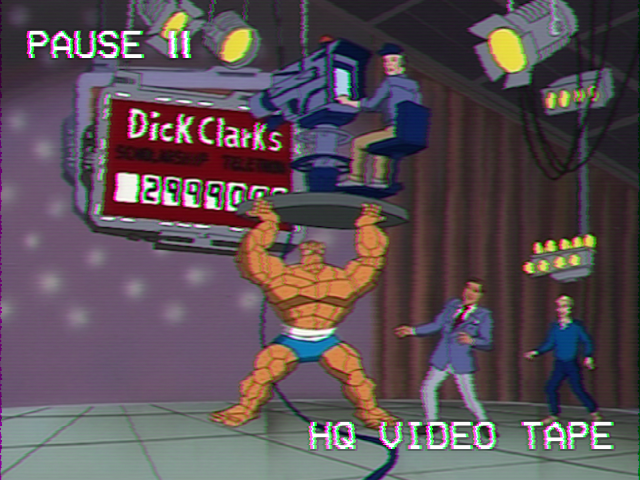
An interpretation of the Fantastic Four animated show, Episode 1

I had the unfortunate pleasure of being present for the Fantastic Four's disastrous appearance on Dick Clark's Scholarship Drive. For those unfamiliar with the event, it is an annual telethon which strives to raise money for under–privileged kids to allow them to get in to university and college.
In the past, it has seen popular guests such as Iron Man, the X–Men and wrestler Rowdy Roddy Piper help to achieve the event's goals.
They raised five million dollars, which is a lot of money and would go a long way in helping kids get an education. But it was the first year in which the marathon had failed to surpass the previous year's efforts. The event before this one, viewers had donated just over ten million dollars after Doctor Doom threatened to blow up the East Coast if the target was not met.
I watched the carnage unfold from the sidelines, the production crew sprinting around me like I was Sunday driver in the middle of the Le Mans race track.
I remember standing next to an older man with a clipboard in his hand, the scheduled scribblings on the page having failed to predict the mess before him. He asked me, or rather, I was the only one not running around to be able to listen to his panic, "what are these idiots doing out there?" to which I replied, "they're telling us how fantastic they are."
Doctor Reed Richards and his self–righteous entrepreneurial girlfriend commandeered the show with brute elitism. When asked by host Dick Clark to share with the audience how they gained their powers, Ms. Storm explained that they would only be giving a very brief statement on the subject as "the whole story is here in our book".
The group were only supposed to have stayed on the couch for fifteen, twenty minutes at best, yet they remained there for the entirety of the show. Guests that lined up at the side of the stage, waiting their turn in front of the cameras were told one–by–one to return to their dressing rooms in saddened retreats. Comic book creator Stan Lee, who nervously practiced his speech beside me, was the last one to be told his turn would never come. "Sorry Mr. Lee," said the young lady whose ponytail had frenzied itself in to a stressful mess, put her hand on the older man's shoulder. "There's not even enough time for a cameo."
Sue Storm announced with a hint of familiar smugness that the book had been written "especially for [Dick Clark's] telethon" and all the proceeds would go to the fundraiser. Yet I knew the horrible truth that I dared not reveal at the time, in fear of the consequences delivered by a group who sat upon pedestals far taller than us mortal men. Most of the profits were being kept by the four, a healthy amount on top of the alarmingly high appearance fee they had demanded for the show. I imagine the rent on the Baxter Building could not be very cheap, but as the whole thing was for charity, I perceived it to be a rather fiendish request indeed.
Perhaps the most terrifying bit of all was the incident involving the poor cameraman.
Towards the end of the show, the donations seemingly slowed to a crawl as it approached three million dollars. Realising if the fundraiser stalled at this low amount, it would reflect poorly on the group, Sue Storm gave a discreet signal to the orange rock creature who she referred to as "a thing".
The rock–man rampaged through the studio, aggressively trying to sell the book and no doubt even terrifying the viewers protected behind television screens at home.
He lifted up a cameraman in to the air and began holding him in a threatening manner that left me worried that a serious injury was about to befall the innocent crew–man.
He was released without physical harm, but the rock–man's show of strength had hurt him in other ways. His colleagues rushed to check he was okay and of course, I could not help but pry in and listen to his whimpering whispers.
He feared for his life, he said to them. He thought of his wife and both the child he had and the child who he was about to have, as a grinding of granite and snarl of stone seemed to contemplate his fate from below.
I would later find out that the employee had filed a lawsuit against the group, a familiar story I had heard many times during my travels with them.
The man had hired Matt Murdock, a blind attorney from Hell's Kitchen, who seemed hell–bent on bringing the foursome to justice. During one meeting in my presence, Reed Richards made a half–hearted apology and offered to give his client a signed copy of their book. Mr. Murdock instead demanded that if he were to sign something, it should in fact be a cheque.
Thinking back to the show, I often wonder if any one could ever have predicted the mess it would become. To the outside world, they were heroes who risked their lives for the people around them. But to me, I knew the real heroes were the studio team who kept the broadcast going. The host was a complete professional the entire night, and to raise five million dollars to help better kid's lives was a fantastic result. It was just a shame about the unfantastic guests.